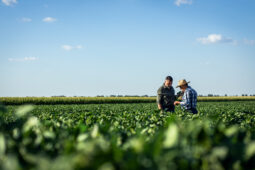We’ve said it before and we’ll say it again: Not all microbial products are created equally.
To this point, author Robert Arnason with The Western Producer recently published an article titled, “Biological Nitrogen-Fixing Products Fail Test.” In the article, he reported that Dave Franzen, a soil scientist from North Dakota State University, spoke at a recent grower conference in Winnipeg, Canada where he shared his thoughts on why nitrogen-fixing biological products often fail.
But did you know that BiOWiSH® is not a nitrogen-fixing product? In fact, our unique mode of action specifically addresses the challenges he called out in his presentation. Read on, and we’ll highlight some of the points Franzen made and provide supplemental support for why our technology has been proven to work consistently, while others often fail.
1. INSTABILITY OF LIVE MICROBES
“It’s difficult to transport the products by plane, train or truck from a manufacturing plant to a farm because some bacteria can be highly sensitive to temperature. For instance, one product is supposed to be stored at four to eight C.” Franzen said.
BiOWiSH’s expert research & development (R&D) and engineering teams have designed a unique production process that allows BiOWiSH® microbes to be coated onto dry fertilizers, or mixed with liquid fertilizers, while maintaining their viability. Our coating and quality control innovations maintain the stability of the microorganisms. This also preserves the physical and chemical properties of the fertilizer in order to meet the shelf-life integrity requirements of the global fertilizer industry. Stability through the supply chain is important because it results in a product that is easy to use for the grower, with a consistently strong value proposition.
2. CHALLENGES WITH INOCULATING SOIL WITH NON-NATIVE MICROBES
“A farmer could add a population of nitrogen-fixing bacteria [to the soil], but there’s no guarantee of survival. ‘If you try to put something in there that is foreign, [the other organisms] are going to try and kill it.” Franzen said.
Rather than trying to inoculate the grower’s soil with non-native good bacteria, BiOWiSH’s proprietary HoloGene 3™ technology works because our endophytic Bacillus deliver soil nutrients to crops through the rhizophagy cycle, a process which also enhances beneficial microbes in the rhizosphere. This mechanism creates a symbiotic relationship between the plant and soil microbes.
We believe this catalyzing approach is the more effective and preferred approach over the daunting task of inoculating large numbers of non-native microbes into the soil. This mode of action is key to consistent performance.
3. NON-SYMBIOTIC WITH THE PLANT
“Yet another obstacle is that these bacteria don’t live in synergy with the plant — they’re not symbiotic.”
We agree, and this realization started our R&D journey over a decade ago, resulting in more than 200 replicated trials across combinations of climates, soil types, and management practices. With our HoloGene 3™ technology, a high-performance, symbiotic partnership between the plant, BiOWiSH® microorganisms, and native soil microbes is the primary mode of action driver. Check out this infographic for more details.
4. NOT ATTACHED TO THE PLANT
“They’re going to be limited by the limited supply of food outside of that root.”
BiOWiSH® microorganisms are endophytic, which means they enter the roots of their host plants and deliver their load of soil nutrients, triggering a cascade of beneficial effects.
5. LACK OF REPLICATED TRIALS
He clarified that dividing a field in two and using a biological in one half of a field is not a replicated trial.
Committed to R&D, BiOWiSH Technologies has an extensive library of research and case studies.
The research trials or commercial development trials (CDT) are small-plot, replicated field trials conducted by independent third-party contract research organizations. They are conducted using three or more replicates per treatment along with the best management practices, and utilize the common fertilizer recommendations of the region as the standard Control.
Demo trials are also used. These are typically side-by-side comparison trials conducted on real commercial farms, also using standard regional practices as the Control. The combination of using both CDT and a large volume of related on-farm demo trials enables BiOWiSH Technologies to assess, compare, and validate results from scientifically-sound research with real-world farming practices.
6. LACK OF CONSISTENCY
Following the publication of the NDSU report, six companies in the biological sector contacted Franzen to discuss his findings. They acknowledged the challenges of getting biologicals to perform in real world conditions.
An example of how our CDT research translates to real-world farming is a summary of 16 on-farm demo trials in the Midwestern United States using BiOWiSH® Enhanced Fertilizer on corn that led to an average profit increase of $58 per acre over a standard fertility program. This equates to a profit increase of $116,000 for a 2,000-acre farm.
Global independent, third-party research conducted at full fertility has revealed that BiOWiSH® Enhanced Fertilizer has an 86%-win rate. In addition, results from more than 200 replicated, third-party trials of BiOWiSH® revealed an average yield increase of 7.7% compared to a standard fertility program.
The BiOWiSH® Fertilizer Enhancement has been proven to work consistently across varying crops, climates, soil types, and management practices by delivering microbes that are both stable in the supply chain and have a high affinity to be symbiotic with plant roots. By demonstrating its proven reliability and efficacious results, BiOWiSH Technologies is able to work with fertilizer partners across the globe to help farmers make the most of their fertilizer investments.
Photo Credit: The Western Producer





